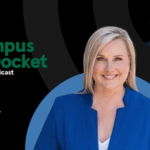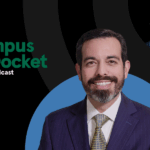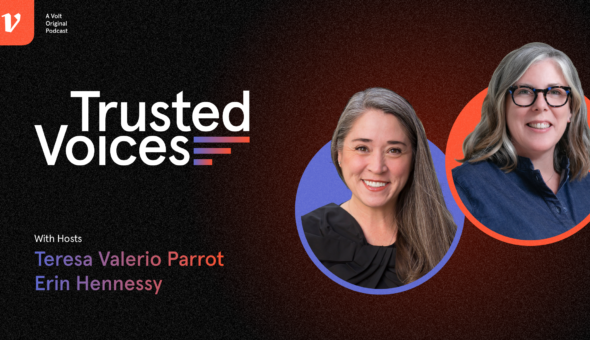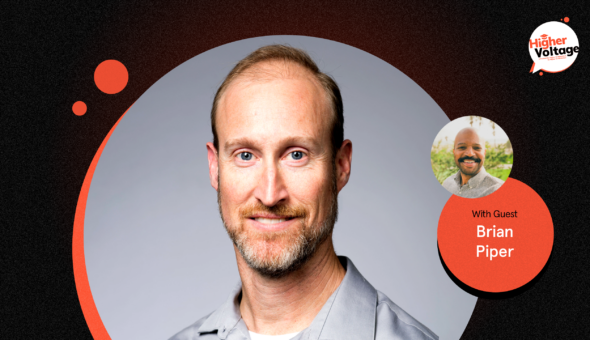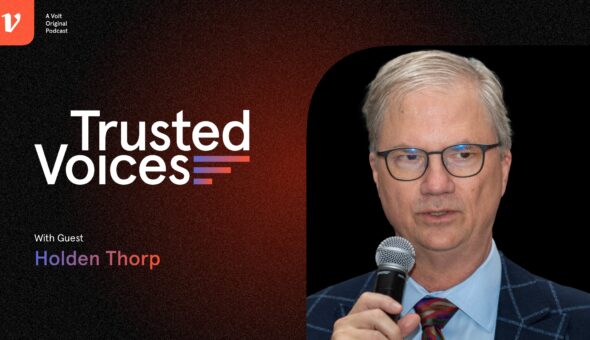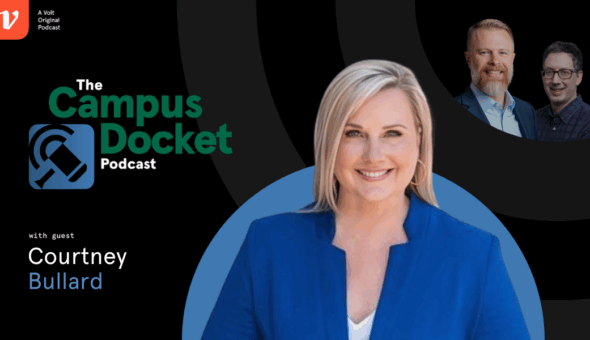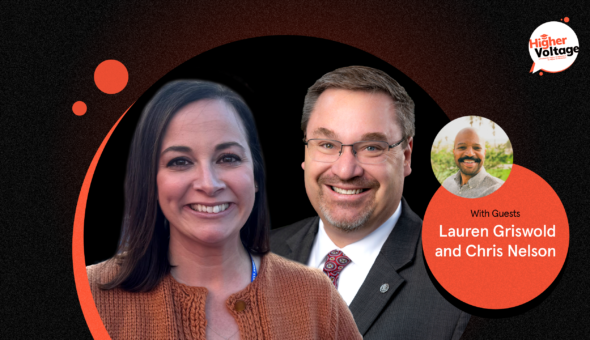Read the full transcript here
Kevin Tyler
Hey, hey, hey, welcome back to Higher Voltage. I am joined by my good, good, friend, my good Judy, Carri Twigg. Those of you who attended AMA, American Marketing Association Higher Ed Conference, may have seen me interview Carri Twigg there. We are having a follow-up conversation today. Where we had the conversation about the value and importance of culturally productive storytelling at AMA, today we are talking about the nuts and bolts of the incoming administration, what we can probably expect in higher education and some other themes.
But before we get into that, Carri is co-founder and head of development for Culture House Media, a woman-owned premium film and television production services and immersive experience company that specializes in storytelling about the cultural questions that shape society, politics, and identity. Carri also served in the Obama White House as special assistant to the president and director of public engagement for then-Vice President Biden. Carri spent over 10 years working at every level of American politics and government. Carri is an expert on crafting engaging, socially relevant, and politically resonant stories, and has been on stages from TEDx to South by Southwest.
Carri, thank you so much for joining me on Higher Voltage.
Carri Twigg
Thank you for having me. Any chance I get to chit chat with you is one I will gladly accept.
Kevin Tyler
Okay, all right. All right. Well, I appreciate that. You’re coming calling from Ohio. I am in San Francisco a little background for those who may have missed it. Carri and I worked together about 20 years ago in Ohio politics, where we first met, and recently in the last year or two, ran into each other on the streets of Santa Monica, the mean streets of Santa Monica, and found out that we were neighbors. So it’s really great to have you on the West Coast. It’s really great to connect with you on this important conversation and it’s really good to have you just kind of back in my life. It’s great. So thanks for doing this with us today.
My first question is around what you’re paying attention to, right? There’s all the speculation and kind of predictions being made about what we can expect, in general, from the incoming administration. I’m curious from an education perspective, what you’re looking out for most in this new administration?
Carri Twigg
You know, to be perfectly honest, so much of, as we know from the first Trump administration, so much of what they say they’re going to do, they are not able to pull off so much of what they sort of throw out as test balloons ends up being the way that they go forward. I’m not putting, one of the things that think we all need to be really cognizant of and mindful of as we enter into the second term is not following the kind of circus act of it all and just sort of staying in our position and waiting to see what’s real and what actually happens.
And so I think it’s instructive and important to pay a little bit of attention to the speculation and the sort of the chaos of it all, but really being clear in our scenario planning of like holding our position, no matter what they do, what do we need to make sure happens. And sort of focusing our effort there until whatever it is that they’re going to do becomes real. Right now it’s all speculative. Right now it’s all suggestion and conjecture. We just learned this lesson with Matt Gaetz as the AG who’s now not the AG and is now doing paid videos on Cameo. mean, what a 48 hours that was.
So for me, I’m kind of always cautioning people of just like, stay in your lane, hold your position, think about what you want to be doing proactively as opposed to getting constantly jerked around by sort of the Trump administration. I mean, Linda McMahon is obviously was something I’m paying attention to though.
Kevin Tyler
Yes, we’ll get into some of that in a little bit. But I think it’s really a sound and sage advice is because it’s very easy to get spun up in the headline of a thing and then start to plan towards a headline and not towards what might become reality. And you’ve wasted either time, dollars, people, folks out trying to respond to a thing that might not have been come to fruition. So I appreciate you offering that.
I want to talk obviously about this proposal to close the Department of Education and move that work to the states and across other federal agencies. I’m curious if you can just kind of lay out what exactly that means, just kind of untie that for people who might not understand how federal agencies work, and then we’ll get into some of the opinions and perspectives you might have about that as well.
Carri Twigg
Sure. So first and foremost, it requires an act of Congress. It requires congressional approval to fully dismantle a government agency. First, that’s our baseline, right? So we know it cannot be done unilaterally by any administration, not just the Trump administration. But what we do know is that it speaks to a narrative that they have perpetuated for years, which is that you can’t trust government. Government is run inefficiently, and then they’re going to starve it of resources in order to prove their point that government does not work well. And so that is what we are about to watch unfold.
One of the things that is really important, and I think we’re gonna see a lot more of over the course of the coming year, is most people don’t know what the government does. Most people cannot talk about intelligently or expertly or even conversationally about what the role that the Department of Education plays, why it exists in the way that it does, and how it’s actually not great to move so many things to the states, because then that means we don’t have universal standards, because every state is organized in different ways.
And if we are going to… education is a global issue. Education is a national security issue. Education is an international relations issue. We are comparing our workforce, our educated young people to the educated young people of the rest of the world. Kids from Alabama, kids from Michigan, kids from Utah don’t compete with China. Kids from the United States compete with kids from China and India and Germany and everywhere else in the world. And so if we have no uniform standards, which is what the Department of Education is able to provide, we’re going to be in a lot of trouble, and we’re going to see a massive distortion in competitive advantages of young people as they enter global workforce. So there’s that.
There is also one of the roles of the government that I think, again, most people don’t consider is to protect things that are socially valued, but not economically valuable. And so that means educating kids with special needs. That means protecting access for children with disabilities and other additional considerations that need to be made. There’s not necessarily money to be made in some of these things. And that’s where the government does them, right? And so when we hear things like, I want to dismantle the Department of Education, move things back to the states, we should be thinking about competitiveness. We should be thinking about universal standards. We should be thinking about who is going to be left behind in that context and in that scenario.
And we should also be thinking about who’s going to profit, right? So the push for for-profit education, which we know President Trump has been a long fan of from his Trump University days, the advocates of, you know, sort of the friendly name school choice or charter school movement or sort of less regulated, more privatized versions of education that exist outside of these universal or federal standards is going to get a massive boon. And that has sometimes, you know, education is a really complicated issue and I don’t pretend to be an education specialist. And so there’s always a counterfactual. There is going to be a charter or a for-profit school that’s extraordinary and that does incredible things for its students. And then there’s also going to be examples where it is just sort of chicanery that is leaving their students and their communities empty and hollow and worse off than they would have been otherwise. And so I’m mindful of that, but there should be a lot of suspicion in local communities about this push.
Kevin Tyler
Right. I couldn’t agree with you more. think that all of the points you raised are excellent ones. The one that tends to get stuck in my, in the folds of my brain is the one around the standards piece. Well, outside of the expense, right? The expense of passing this work to the states is one thing, but also the standards piece. The example that comes to mind most immediately is that if we have a curriculum that is coming out of Florida that highlights or features one, certain kinds of information, how does an institution, a higher education institution decipher which applicants have mastered the kinds of information and functions that we expect them to know at the time of their application to college or university versus someone else? And that’s the kind of knots and thickets that I expect to have some of the most conversation around. There’s the policy piece, of course, right? There’s that piece that’s gonna be a gigantic thing, but like the day-to-day like operations of an admissions and recruitment function on a campus, feels like it’s gonna be next to impossible because you don’t know who’s learning what and how good they are at any of it.
Carri Twigg
Absolutely. I mean, it’s such a good point. I didn’t even think about that. And listen, this is not to obscure the fact that I’m sure that the Department of Education could use some advancement, could use some innovation, could use some revamping, that there are, that it should be as subject to scrutiny as anything and anyone else. I don’t think it’s inherently wrong to reconsider how we have done things historically when a new administration comes in. I don’t think that’s wrong.
And I would be far more open to this as a concept if I had any confidence that the incoming administration actually even understood what was even there. Linda McMahon doesn’t even, I mean, we’re going to get to her, but like she doesn’t want to be Secretary of Education, right? Like they’re not dismantling it because they have some clear-eyed experience with it and they know it in and out and they therefore have a meaningful, obvious road path of how to move it forward, how to innovate. They are attacking it and trying to dismantle it and trying to “move it back to the states,” right? With a under sort of the guise of not even knowing what it is that the and I think that’s what makes so many people so suspicious, rightly so.
Electric Kite Ad Read
Kevin Tyler
I’m curious around (a) the piece around innovation, I think, is a necessary one, right? There are pieces that I think about often in higher ed that I’m like, OK, this could be, we need to think about this, right? Pell Grant amounts, that could be an increase, right? The way the FAFSA was rolled out last year, problematic, right? So we have these opportunities for improvement in the space. But I think this drastic measure has a lot of people concerned, rightfully so. And I’m curious around what kind of concerns were raised by the announcement of Linda McMahon being proposed as the Secretary of Education. What does that sound like to you? What does it mean to you? What should people be thinking about as they’re reading articles about this nomination?
Carri Twigg
To me, first and foremost, she doesn’t want to be Secretary of Education. She wants to be the Commerce Secretary. In the first Trump administration, she spent a lot of that time as the head of the Small Business Association. I’d have no problem with that. I actually have no problem theoretically with her as the Commerce Secretary. I mean, I have lot of problems with it, but it at least feels as though it’s something that she is interested in and knowledge of and expertise in. She was openly campaigning for a different job.
And so to put someone who has, I mean, I think she served on the Connecticut State Board of Education, other, like, she’s not a policy expert. She’s not a teacher. She’s not someone who has been passionate about this issue. And again, to me, that is basically what I was saying earlier. That’s my issue is that there is neither knowledge nor care for the Department of Education or for education itself in a way that is demonstrable.
Again, if you’re going to change something, change it because you love it, change it because you want it to be better. Change it because you want a better outcome for young people in a very specific, expert, knowledgeable, concrete way. And that to me is not present in this moment with her as the pick. It’s sort of this very surface level, I owe this woman because she gave me so much cultural cache and financial help during the campaign and so I’m giving her this job, not even the one she wanted, but one that has relative prominence. But it’s not a serious pick, it’s just another kind of campaign giveaway. And I would, I think we should treat that with a lot of scorn.
Again, if he had proposed as secretary, a education expert, someone who had spent their career, trying to figure out how we can make education a better experience for children and for families and for communities to help a workforce to think about higher ed and what it means to prepare kids to go out into this world and to be innovative and to be entrepreneurs or to be whatever it is that we are thinking as the highest gold standard of what an educational experience should be. If he had picked someone who, even if I disagreed with them, but had dedicated some meaningful portion of their life and work to that cause. I would be willing to tolerate it, but I don’t think that’s what we’re seeing with Linda McMahon.
Kevin Tyler
I think that’s a fascinating perspective. I think that it raises in my mind a statement that I heard many years ago by a guy named Brandon Busteed, who I very much admire in the space of higher education and education at large, who said that once a thing in America becomes politicized, it is virtually impossible for it to become unpoliticized. And I feel like we are seeing right now education hit the peak of politicization, right? We are seeing these conversations like the ones we’re having now that speak to not it as a important right in our society. We are talking about these other terms inside of a new frame that feels like it—makes it feel like it’s worth less, right? Like it’s not as important because we’re playing these games with it. And I’m curious if you think that there is a way for a thing like education in American society to become unpoliticized. And if so, how does that even happen?
Carri Twigg
That is fascinating. I think maybe yes, yes and no, right? I think that what actually happens is that society is a dynamic force, cultural values are dynamic. And so things that were once divisive gain so much support that they ultimately no longer become an issue of division. And so you think about the Affordable Care Act, right?
Kevin Tyler
Uhuh.
Carri Twigg
Hugely divisive, hugely politicized issue. Now something like 85% of Americans support it, 95% of Americans support protecting pre-existing conditions, and so many of the clauses of the Affordable Care Act so that Republicans can’t get rid of it. And so no one talks about it anymore. So, I think that it’s maybe; I don’t know that there’s some sort of active depolitization so much as there is. Once both sides real, once it no longer becomes an issue that you can win an electoral contest on, everyone just sort of forgets about it and lets it happen and continue to exist.
I mean, even think about like marriage equality, right? You have JD Vance, the incoming vice president-elect say, you know, we don’t have a problem with gay guys. We don’t have a problem with gay men. We don’t have a problem with gay men.
Kevin Tyler
No more. No more.
Carri Twigg
So long as they’re normal. So long as they are normal, so long as they adhere to conventional gender standards. What we have a problem with is transgender people. And so, two dudes is so normal in our culture now. Two men, two women, that’s so normal. The Republicans know that it’s not the days of 2004 when that was a high, I mean, recently in my career, in our career that was an issue that you could win or lose a presidential contest on. In 2008, Barack Obama was only for civil unions, not for marriage equality. So, and now it is so ubiquitous, it is so sort of unassailably American that in terms of fairness and equality that gay men, lesbian women can be married, but the transgender issue is obviously this massive division.
So I think that there are, because cultural values evolve, because culture itself and society itself evolves, you can depoliticize things or they just become depoliticized, but maybe not in wholesale, maybe not in exactly the same terminology. Like Barack Obama’s a divisive figure, but his key legislative initiative, the Affordable Care Act, is not, right? So. Gay men being married is maybe not controversial, but transgender rights and gender affirming healthcare is. So I don’t know that it’s a one-to-one. And so I suspect that we’ll see something very similar.
I mean, even around sustainability, environmental and climate action, right? The fact that the, I think the CEO of Exxon or Chevron came out and was like, time out, okay, this guy you’ve nominated to the EPA is like a bit too much. Like we actually don’t, it’s actually not helpful if you roll back all of these regulations, because we’re doing this, it’s happening, the world is getting hotter, we have to do something. You should actually take it easy. That was a mind blowing thing. So I think it’s maybe not as cut and dry as politicized, non-politicized, so much as there’s just shifts about what has such broad acceptance that we just sort of allow it to exist untampered.
Kevin Tyler
I think that’s really fair response to an idea about that. Since I heard him say that, it’s been kind of a theme that I revisit in my mind and that I revisit on this show quite often because it feels so right. And that might be because of my intersectionality, it might be all types of reasons, but it felt so right. I’m curious, moving into more of like a optimistic frame, if you will.
I’m curious if you have been able to give any thought to the idea of what opportunities might exist for higher education in this new political context. What should we bet on or bank on? What opportunities do we not lose anything?
Carri Twigg
This might be a controversial opinion.
Kevin Tyler
I’m here for it. Bring it. Do it. Say it.
Carri Twigg
This might be controversial. And again, I wanna say I am not an expert. So if this is the dumbest thing your listeners have heard, just forgive me. But because they’re so disruptive and because they don’t have a concrete idea of what’s in its place, you have an opportunity for the experts to rise to the floor with the experiment they’ve always wanted to run.
Kevin Tyler
Yeah.
Carri Twigg
So people who are looking for innovation, people who know this backwards and forwards, who love this, want to, who have wanted to innovate, but sort of haven’t quite been able to move through the channels of bureaucracy or gotten people to be willing to take a risk, like now is your time.
Kevin Tyler
Yeah.
Carri Twigg
And so for the people who love education, for the people who are genuinely in the business of protecting teachers, students, and the institutions that make it all run and who have the data, have the research, know that there’s a better way than the current status quo. Now is your time to rush to the fore and fill that power and leadership vacuum that is inevitably going to exist because Donald Trump is appointing people who do not know what they’re talking about.
And that means you probably have to work within a structure and with people that you might disagree with, that you might find distasteful. But if you are willing to do that, you could potentially advance, make huge advancements and advance a lot of really interesting programs and ideas that accomplish what you want just at the kind of largesse and with the group and alongside people you might not have wanted. But if people are willing to do that sort of inside work, then I think it represents a massive opportunity. But I recognize not everyone’s always willing to do that. And that might be an overly simplistic perspective, but I think it’s there. I mean, the reality of these guys are open to new ideas. And so if you’ve got one and you’re ready to go and it’s turnkey, I would get a flight to DC and get cracking.
Kevin Tyler
I think that that is one of many, many opportunities. I think one of the things that feels most primed is this notion of collaboration in the space. I think that in reduced circumstances, we’re kind of forced to try all types of things, to do all types of things. And I think one of those things is working together as an industry instead of relying or leaning into the competition that has been such a characteristic of the higher ed industry. And what would it look like if we now understand that we’re all caught on our heels in this moment of political kind of shifting? What it might look like for us to work together to reintroduce the value of higher education inside of states, across states? What does it look like for new partnerships to emerge out of this kind of contracted space or pressurized space in such a way that people get new ideas of what’s possible coming out of higher education?
I mean, let’s be real, like higher education touches so many parts of our lives, whether it’s for our own individual personal lives or for like what we come in contact with day to day, higher ed is always going to be there. And so I think that in this kind of what I’m describing as a reduced circumstance, just because of all the conversation that has happened around and about education and higher education specifically, we might have opportunities to form collaborations that have never been imagined before by virtue of necessity, by virtue of scarcity, even just fear, right? Like who can we ask to do new things to support what we are trying to do every single?
Carri Twigg
Mm-hmm.
100%. Such a good point. And listen, one of the things that protects people in this moment, or protects people from threat of all kinds is power, right? And what gives people and particularly issues power is attention and is the cultural value that underpins it. And so you are about to have an experience where things that are sacred to people, even if they don’t realize it, are about to be threatened. And if you can be there to message, and connect the dots for populations that generally don’t pay attention to this space and say, is why this has to be this way. You should always protect it or always be suspicious of people trying to take this away. To your point, you can build so much power for advocacy movements, for particular ideas, for particular leaders, for institutions, if you’re poised and ready in that moment to do some meaningful storytelling and connection and marketing and like grassroots work. And that I think is another opportunity that will endure beyond whatever that specific moment of threat is, right? The things that the society holds dear don’t get messed with, right? It’s back to the depolitization of like pre-existing conditions or marriage equality. You can’t mess with them anymore. So the people who have opposed it just got on board and just they got on board.
Kevin Tyler
Yeah, I think about also what might occur with HBCUs in this space. I am hopeful for kind of an influx of applications and matriculated students. You obviously never really know. We’ve seen that trend in the last administration, right? That an uptick in those applications, a considerable uptick in the applications, but then there’s also a funding piece, the diversity piece, the role of HBCUs in the higher education landscape. I hope for the best, kind of expect the worst. And that’s just kind of, I don’t know that’s my political background talking, but..
Carri Twigg
At the same time, right? This is where the increase of African American voters who supported Donald Trump might really benefit HBCUs, right? It might open an opportunity for Donald Trump to be like, yeah, you guys, I’m going to give you more funding in a way that we saw Barack Obama do, but in the sort of loud, which then becomes its own thing because Donald Trump is so loud and splashy about everything that he will then tout it for a generation.
Trusted Voices ad read
Kevin Tyler
You have a extremely refined political lens, and you see things about to happen in the world because you are so in tune or aligned or so aware of policy. I’m curious if there are consequences that you might see coming down the line for education that we might not be seeing because we’re so focused on the education department, but there’s lots of inputs in that, right? There’s commerce, there’s all these other things happening around the space. Are there other things that education/higher education should be on the lookout for in this time of political shifting?
Carri Twigg
I mean, they’re all so big. That’s one of the challenges, I think, is like the scale. Not even that, so many people just don’t know, so many people don’t understand what these agencies do, but they also just don’t understand the scale that these agencies operate on. And so I think a huge warning flag that we’ve seen.
Kevin Tyler
Right.
Carri Twigg
Listen, it’s not unique to Donald Trump, this has been a force in the American American life for a very long time, is the massive separation of a hyper elite and sort of everyone else. And education plays such an important role in that. And so are we moving towards educational models that are going to… Like (a) how do they keep up with the rate of change? But then (b) are they just preparing? Are we going to see greater, especially when you introduce a profit model into education, are we just gonna see a greater separating of this world-class education that goes to the tiniest fraction of Americans and sort of a degrading of everything else for everyone else?
And so you’ll always be able to say that there’s a version of education in America that is the best in the world, but it’s not what the vast majority of American young people are getting to experience. And so that dynamic’s already at play. Listen, I went to a school that was funded by local property taxes and was one of the best in Columbus. I’ve already, I’m a product of that. And if I had gone two miles down the street, I already would have been in a school that dramatically offered a much worse product.
So again, it’s not as though this is all hunky dory and everything’s great and he’s gonna come and break a perfect system. There are huge problems to how we have organized education in this country. I just worry that it’s going to exacerbate it in a way that we’re already seeing wages, the ways that we’re already seeing so many other elements of American life.
Kevin Tyler
Yeah, I do anticipate, just kind of personally, the only word that comes to mind really is this perversion of status, essentially, access, perversion of all the things that kind of define what is typically called “the American dream.”
Carri Twigg
Mm-hmm. Mm-hmm. Yeah.
Kevin Tyler
Like, I feel like that’s going to get stretched apart. There’s going be lots more holes for people to fall through because of some of these decisions.
I asked about opportunities and I think that this is a different kind of question. I’m gonna ask it anyway. In this moment, what advice would you give to higher education marketers who are looking into the horizon wondering what the hell am I about to, like what do we do here? Like, right? Like what advice do you have to give us marketers?
Carri Twigg
Yeah, I mean, now it’s never been, it has never been more important to know exactly who you are and the position that you occupy. And at a time when, I don’t know, I often feel like marketers across industry, right, do fall into this trap of wanting to be, wanting to reach as big an audience as possible. And so they end up saying almost nothing.
And now it’s like, now is the time to specialize. Now is the time to find your niche and stay there and operate from that place and be unapologetic and transparent about who you are and what your positionality is and how you view the world and what coming to this institution represents as a cultural choice, but also what you will get in exchange for it. I think now is also the time to be unabashed about what people owe the institutions in their lives.
Right? So young people’s job is to be poured into, adults job is to be, is to give back. And so I would be sending the most aggressive alumni emails you can possibly imagine in terms of like, find students in your life to talk about, like talk about this institution in your, in your local community, send us students that we should be thinking about, send us your money, send us your time, your treasure.
We are giving our students X, Y, and Z. We are looking for students who do X, Y and Z. We have noticed a gap in our community or in our potential student base, and we want to find those kids. You have to help us. Like, if you have come through this institution, you actually owe us a debt that can’t be repaid. And so what does that actually mean? And how does that advance the goals and needs of the institution?
I think that we as an American society, got really far away from this kind of fundamental value that to whom much is given, much is expected. And we need to retrain and institutions play a vital role in that. Like what institutions give, particularly higher education institutions, is actually intangible. It’s beyond your tuition. I’ve given, I gave Ohio State University the, Ohio State University, $12,000 of tuition back in the early aughts. It’s like, but what I got in exchange has endured for the rest of my life. And so having that conversation is really important. And I think now is the time for institutions again, to really hone in on what they’re saying, to be really unapologetic and be really clear about who they are and how they exist and what space they occupy and to be demanding. To demand that the community that they have served for so long rally to their defense and rally to their aid. And I think so often when we’re in these moments of threat, we tend to (a) try and offer a broad appeal and then (b) come from a place of scarcity and gratitude anytime anyone wants to help us. And it’s sort of the wrong instinct. It’s like you have to actually, now is the time to be bolder, not more obsequious.
Kevin Tyler
I really appreciate that perspective. think that there is great value in standing firm, standing, 10 toes down, right on business. I also see this as a time at which, I mean, I wouldn’t say there’s nothing to lose, but like, we have an opportunity to be extremely bold.
And I think that the idea that you and I talked about kind of solely at AMA, this idea of incorporating or weaving culture into this makes it a whole different story. It makes it a whole different message. It makes it feel new, as long as that can be reinforced in the actual experience that students are getting on your campus. This whole new notion of telling a story about an institution from a cultural lens, from a cultural perspective is really exciting to me as long as people are doing it right, right? Because that’s where things can get real dicey. But I think it’s an exciting kind of turning point in the ways in which we are talking about the offer and value of higher education and what a degree can give.
And I’m not saying at all that it is the only path to success. I recognize that there are other ways to get to wherever people are trying to go. But higher education is a valid and legitimate pathway option for folks. And we need to take advantage of the space that we don’t have to talk about ourselves in a more bold way.
And I think again, you know, who wrote Handmaid’s Tale, Margaret Atwood, she’s got this line in this book called Cat’s Eye that says like in reduced circumstances, we’re forced to believe all sorts of things, right? And I think that’s the moment we are in now in higher education, are in such reduced circumstances that we have to figure out new ways to do what we’ve always done. Now is our time.
My last question is one that I ask every guest on the show. I’m curious from your perspective, in whatever lens you want to look at it, what do you think higher education is going to look like in about 10 years, five or 10 years?
Carri Twigg
Honestly, I think that it is going to look like 90% of people functionally going to some version of the trade school and then the remaining 10% going to these like hyper elite extensive experiences that probably last longer than four years.
Kevin Tyler
Ooh, say more about that. This is the first answer that sounded like that. So I wanna dig in a little bit just on some of that. I know you’re recognizing that you’re not positioning yourself as an expert, as a futurist in higher education, but just based on what you’ve learned and know, I’d love to learn more about this.
Carri Twigg
Yeah, wildly speculative. This is fully just vibes. I have no data. But I think that college has gotten too expensive and the return on the investment has fallen apart. And so the vast majority of students who, the vast majority of Americans have no meaningful or realistic expectation that they’re ever going to make $100,000 a year or let alone three, five, seven, a million dollars a year. And so why would you go get an English degree?
Why would you do that? And so colleges are going to inevitably, if they want to compete with students who are willing to pay, they’re going to have to take much more of a trade school model, especially if tariffs go into place, if all these economic things go into place, we’re going to see a rise in sort of American making and American manufacturing of all kinds. And that does mean robotics and that means all sorts of things, but I think you’re going to see much more technical education, a movement away from sort of broad strokes humanities education, go into much more kind technical education.
And then you’re going to have this hyper elite that want their kids to read Hemingway and want their kids to watch obscure Japanese films and want their kids to engage in a much more kind of comprehensive and holistic educational experience and are willing and able to pay for it.
Kevin Tyler
Hmm.
Carri Twigg
I also think that as we watch life expectancy increase, why would you go to college for four years and start working at 24? You’re not really that mature. You’re not really like why? So go and do a six-year, seven-year degree that is going to give you everything you need around AI and sort of the technical world, but also give you this grounding in the arts and allow you to take your time. And maybe you travel, maybe you go and live somewhere else for a couple of years and you spend more of your twenties becoming a person, you learn more of you have more emotional sort of neurological training, you have a wellness track as well that you go through that helps you figure out how you’re going to collaborate with others and how you talk about your emotions in a way that enables you to be the kind of leader that actually is going to matter in the next generation. And so that is going to be something that elite parents will always be able to afford and will want for their children.
And so we’ll send them into that place. And because they have time and because they have money, they are going to have this really kind of grand curated, elaborate experience. And then basically everyone else is going to have to figure out how to be trained to run this life that this hyper elite is going to organize.
Kevin Tyler
This is going to be a fascinating number of years. I’m not sure how many that’s going to be, but I look forward to having more conversations like this in the space because I think the more conversations we can have, the more ideas come to the surface. And I can’t thank you enough for joining me on Higher Voltage today, Carri. Thank you, thank you, thank you for making time for this, especially over this holiday week. I would love to invite you back as we get into this next administration to see if there’s any sort of new things we should pay attention to, things that have not come true, whatever. But this has just been a really great time sharing ideas and going back and forth with you. Thank you so much.
Carri Twigg
Thank you.

